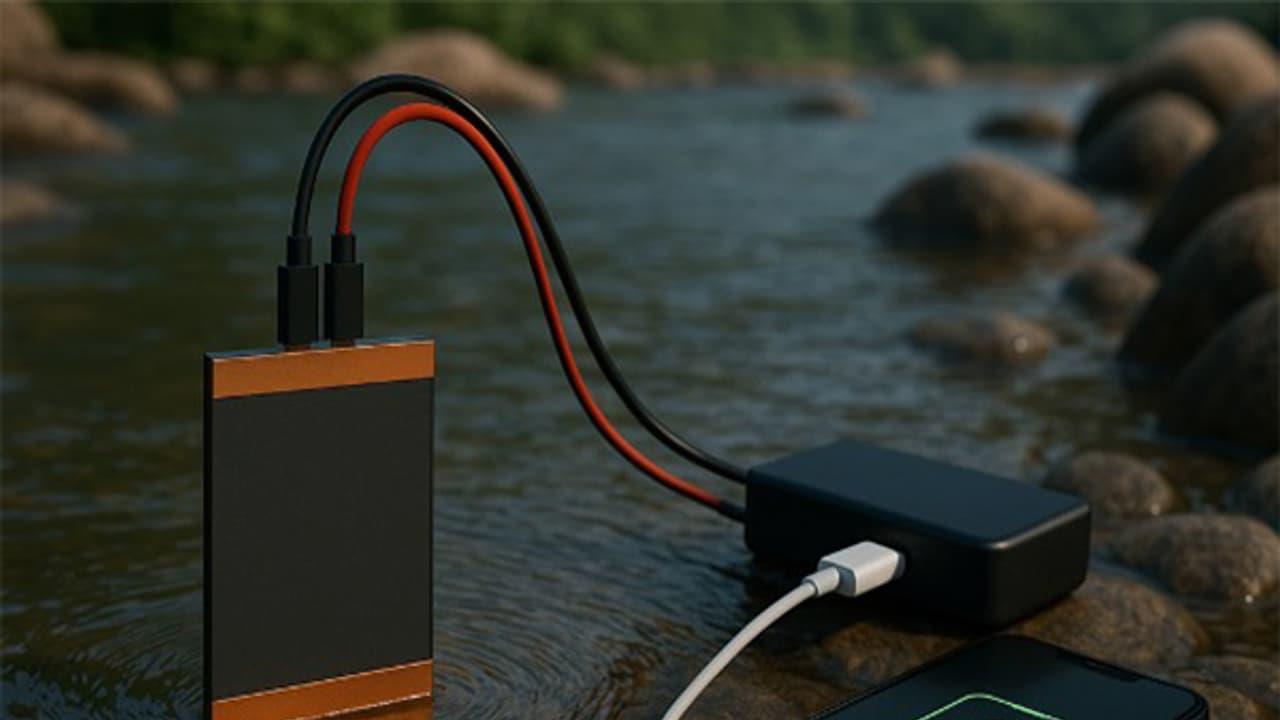IIT Indore Develops Device Generating Electricity From Water And Evaporation
Professor and Students at the Indian Institute of Technology Indore (IIT Indore) have developed a unique device that produces electricity using nothing but just water and air--without the need for sunlight, batteries, or moving parts. The device silently taps into the natural process of water evaporation to extract thermal energy from the atmosphere, converting it into clean and sustainable electricity for small electronic devices.
According to an official release, this research comes from the Sustainable Energy and Environmental Materials (SEEM) Lab at IIT Indore, led by Prof Dhirendra K. Rai and his research team member, Khushwant Singh. At the heart of the invention is a specially engineered membrane made of graphene oxide (a layered form of carbon) combined with zinc-imidazole, a stabilizing compound. When the membrane is partially immersed in water, it begins generating electricity as water travels upward through microscopic channels and evaporates. This evaporation-driven movement separates positive and negative ions at opposite ends of the membrane, creating a steady voltage.
A single membrane of 3 x 2 cm2 can generate up to 0.75 volts, while multiple membranes can be combined to scale up power output. Remarkably, the device works not only with clean water but also with saline or muddy water, retaining stability for months. Its versatility makes it ideal for regions with unreliable electricity or limited access to power. Potential applications range from powering environmental sensors in forests and farms to providing emergency lighting during blackouts or supporting low-power medical wearables in remote clinics. Unlike solar panels, the device works indoors, at night, and under cloudy conditions. Lightweight, portable, and compatible with even unfiltered water, it promises a robust solution for challenging environments.
Statement of Director of IIT Indore, Prof. Suhas Joshi in the release read,“This innovation is a testament to IIT Indore's vision of creating knowledge that matters to society. By turning the simple phenomenon of water evaporation into a dependable power source, our researchers have opened new pathways for sustainable technologies. Such ideas can transform lives, especially in rural and underserved communities, and reaffirm the role of science in building a cleaner and more equitable future.”
Prof. Rai highlighted the broader vision of his team and said“Think of it as a self-charging power source, fueled by nothing more than air and water. As long as evaporation continues, the device generates electricity--quietly, cleanly, and sustainably. Our aim was to design a solution that is both affordable and effective, so it can one day find real-world use in rural and off-grid areas.”
Furthermore, the team plans to optimize costs by using clay-based compounds and common minerals, making the design suitable for large-scale manufacturing. This device aims to fill critical gaps by powering small devices where other sources fail--acting as nature's own trickle charger. Future applications could even extend to energy-generating smart textiles or self-powered walls that run indoor sensors. This discovery underscores the potential of Indian scientific research to convert fundamental curiosity into technologies that address pressing societal challenges, the release added.
(Except for the headline, this story has not been edited by Asianet Newsable English staff and is published from a syndicated feed)
Legal Disclaimer:
MENAFN provides the
information “as is” without warranty of any kind. We do not accept
any responsibility or liability for the accuracy, content, images,
videos, licenses, completeness, legality, or reliability of the information
contained in this article. If you have any complaints or copyright
issues related to this article, kindly contact the provider above.
Most popular stories
Market Research

- Wiener Bank SE Partners With REAL Finance To Revolutionize Asset Management With Blockchain Technology
- B2PRIME Secures DFSA Licence To Operate From The DIFC, Setting A New Institutional Benchmark For MENA & Gulf Region
- Stonehaven Circle Marks 13Th Anniversary With Hadrian Colwyn Leading Calvio Ailegacyx Innovation
- Daytrading Publishes New Study On The Dangers Of AI Tools Used By Traders
- T-REX Launches Intelligence Layer To Fix Web3's Value Distribution Problem
- Bitget Launches PTBUSDT For Futures Trading And Bot Integration




















Comments
No comment